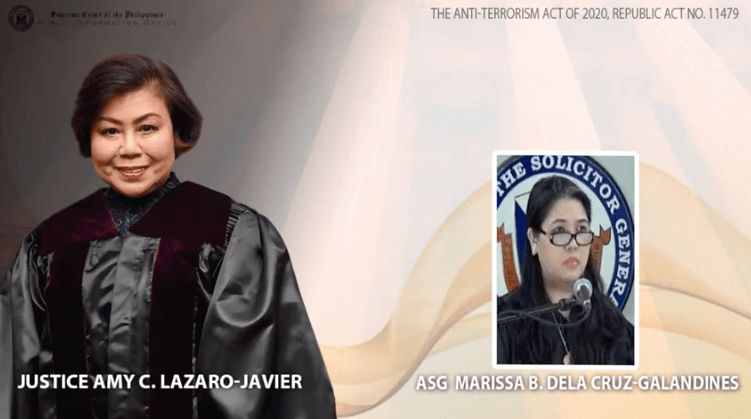SUMMARY
This is AI generated summarization, which may have errors. For context, always refer to the full article.

What has the Duterte government done to ease fears that the anti-terror law would be abused?
This was the question of Supreme Court Associate Justice Amy Lazaro-Javier to the government lawyers from the Office of the Solicitor General (OSG) during Day 7 of the anti-terror law oral arguments on Tuesday, May 11.
Assistant Solicitor General (ASG) Raymund Rigodon said that President Rodrigo Duterte already told the public that “if you’re not a terrorist, you have nothing to fear.”
Moreover, Rigodon said, “In his opening statement, Solicitor General Jose Calida pointed out that the government is not the enemy here, but the terrorists.”
“Is that enough? Is that enough to allay the fears, the suspicions, the apprehensions, the repugnance of the public? Is lip service enough?” Javier asked.
Rigodon read from the law’s declaration of policy, which states that “the State recognizes that the fight against terrorism requires a comprehensive approach,” to identify “the root causes of terrorism.”
But before Rigodon could finish reading that lengthy clause of Section 2, Javier cut him off.
“Please pardon me, but I think the answer is not responsive to my question. So please, I have no time to debate with you on this, so please present this in your memorandum,” said Javier.
Judicial functions
Just like Day 6, the OSG representatives were again grilled on the contentious Section 29 which provides for a 24-day detention without judicial warrant of suspected terrorists.
The Revised Penal Code only allows a 36-hour detention for people arrested without warrants, while the Constitution provides for three days but only if there’s a state of martial law.
Petitioners have pointed out that these powers by the anti-terror council, made up of Cabinet members, usurp the power of the judiciary to issue warrants.
Once again, ASG Marissa dela Cruz-Galandines insisted that the council does not issue warrants of arrest, only authorization for detention. Warrantless arrests, Galandines said, will be based on regular grounds such as caught in the act, probable cause to believe a crime has just been committed, or a fugitive.
Javier asked Galandines: If someone was arrested without a warrant, can the anti-terror council deny the request for a 24-day detention on the basis that it was an invalid arrest?
Galandines said the council can.
“But if the anti-terror council does that, isn’t that an encroachment of judicial functions?” Javier asked.
At this point, Galandines had to insist that “it’s a mere act of supervision and not an act of judicial function.”
Petitioners have pointed out that of all the controversial laws challenged before the Supreme Court, this is the law that takes from them their judicial powers.
Freezing assets
On the issue of designation, Javier cited the case of the Rural Missionaries of the Philippines (RMP), a group of nuns that the government accused of being fronts for communist rebels, and whose assets were frozen under the Terrorism Financing Act or Republic Act No. 10168.
The RMP’s assets were frozen when there was no anti-terror law yet. Under the anti-terror law, the Anti-Money Laundering Council or AMLC, can automatically freeze the assets of a designated terrorist. This is what happened to the Communist Party of the Philippines–New Peoples’ Army (CPP-NPA) after its designation in December 2020.
In both the anti-terror law and RA 10168, AMLC can freeze assets on its own but only for a period not exceeding 20 days. To extend that, AMLC must go to the Court of Appeals (CA).
Similarly, the suspect may also file a petition to lift the freeze order with the CA, but only within the 20-day period.
Javier recalled that the RMP was only notified that its assets were frozen only after the 20-day period, “hence they were barred from challenging it.”
“Wouldn’t these circumstances render sanctions such as freeze order virtually unassailable in cases where there is delayed service of notice? In that case, would you still say there is sufficient remedy under the law?” Javier asked, pressing Galandines to provide a remedy in case of situations where the 20-day period lapses because of delays beyond someone’s control.
But all Galandines could answer was: “The power of the AMLC has been recognized and it’s in pursuant to our countries’ obligation.”
Galandines said the provision was just lifted from RA 10168, which was a standing law. Galandines said that the anti-terror law’s implementing rules and regulations provided a process for delisting anyway.
“Delisting is one thing, lifting sanctions freeze order is another, and the law is clear, the party can seek its lifting only within 20 days,” said Javier, then she moved on to another topic. – Rappler.com
Add a comment
How does this make you feel?





There are no comments yet. Add your comment to start the conversation.